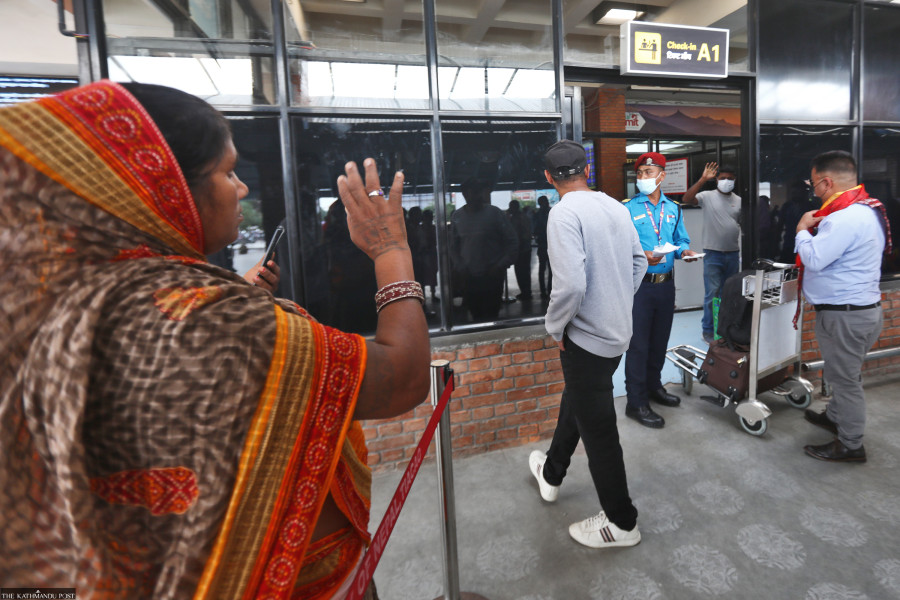Money
Report shows increasing vulnerability of Nepali migrant workers
Nepal and its labour-receiving countries have effectively failed in ensuring the migrant workers’ rights, experts say.
Pawan Pandey
Shailesh Kumar Thapa (name changed) from Sindupalchok district went to Saudi Arabia in December of 2018 with hopes of making 1,000 Saudi Riyals ( around Rs35,300 ) a month.
The private recruitment agency, which facilitated his employment in the overseas job, had assured him that he would work as a labourer for a construction company.
Thapa was charged Rs135,000 by the recruitment agency, which is illegal, according to the existing government policy of free-visa and free-ticket.
However, after landing in Saudi Arabia, Thapa was received by a representative of a different company than what was mentioned in his contract. The following day, he was made to work at an ice cream factory, which went on for a month.
Thapa, who had hoped for a stable job and earnings, was made to do several temporary jobs in the first half of 2019. He was neither paid on time nor sent back to Nepal, which he requested, continuously.
Thapa was able to return to Nepal only in July 2019 after the Pravasi Nepali Coordination Committee (PNCC), a non-governmental organisation working for migrant workers’ rights, coordinated with the Nepal embassy in Riyadh, for his return. Thapa’s account is one of the 11,616 cases, involving 16,818 workers, registered at PNCC from 2018 to 2022.
Equidem Research Nepal, a migrant rights and human rights research organisation, studied the cases, besides interviewing 22 migrant workers and their families, to prepare a report titled Chunautiko Chapeta.
The report, which highlights the challenges and exploitations faced by Nepali migrant workers in the migration cycle, was made public last week.
Of the cases, nearly 93 percent were related to those who worked in Saudi Arabia, Malaysia, Qatar and the UAE, the major destination for Nepalis for overseas employment.
The report shows the increasing vulnerability of Nepali migrant workers.
Though the PNCC received fewer cases in 2019 than in 2018, the number of cases increased in the past three years—2,310 in 2020, 2,556 in 2021 and 4,347 in 2022.
The report shows that workers going to the Gulf and Malaysia were made to pay exorbitant and illegal recruitment charges, faced contract breaches, wage theft, difficulties in access to justice and hassles for returning home, and getting their rightful benefits and compensations.
Concerns have been raised over systemic issues in the compensation system after the police last month arrested several persons for defrauding families of dead migrant workers of their compensation.
Rameshwar Nepal, executive director of Equidem Research Nepal, and the lead researcher of the study, said that Nepal and its labour-receiving countries have effectively failed to ensure the migrant workers’ rights.
“Nepali migrant workers have become more vulnerable to exploitation, right from the recruitment phase,” said Nepal. “It is alarming.”
The report also shows that workers were sent abroad on a visit visa.
Nearly 1000 cases, of which two-thirds involved recruitment through private agencies, showed trafficking or indicated as much.
Besides having a free visa and free ticket policy, Nepal has separate labour agreements with Malaysia and the UAE to implement the employers’ pay model.
But the migrant workers were charged a minimum of Rs35,000 and in some cases a maximum of Rs450,000 during the recruitment process. Nearly half of them had gone for overseas jobs with institutional labour approval.
Workers took loans to pay the recruitment agencies or their agents at 36 to 60 percent interest rate, which pushed them into debt bondage.
Though Qatar announced the end of the exploitative Kafala system, which restricts workers from changing their jobs or leaving the country without the permission of the employer, in 2020, employers in the country created trouble for workers to change employers, the report says.
“To restrict the workers from changing employers or leaving the country, the employers often file charges of abscondment or theft against them, which results in their arrest,” the report says.
Awadesh Kumar Verma (name changed), a migrant worker from Morang district submitted his resignation to return home after working for five years in Qatar in 2022, but his employer filed a complaint that Verma attempted to leave the country without receiving clearance from the company and barred him from returning home.
The accounts of the workers show that many of them remained undocumented when their employers failed to issue or renew their residential permits and health cards on time.
Undocumented workers and their families remain ineligible for receiving benefits and compensation in case of an injury or death.
Though there are rules in destination countries such as Qatar, Malaysia, UAE and Kuwait, prohibiting employers from keeping the passports and other documents of the workers, they continued to do so.
Nealy 2,000 cases show at least one condition of forced labour.
Some workers’ families said that one of the causes of deaths by suicide of migrant workers was anxiety from the injustices they faced during the recruitment or work.
Brisheslal Mahato (name changed), who had gone to Saudi Arabia in 2015, died by suicide in 2019.
His family claims Mahato wanted to return home after two years, but the employers did not allow it, which caused him to take the tragic step.
Of the 1,578 cases related to the deaths of migrant workers, the cause of death in as many as 523 cases was not mentioned.
The families of the migrant workers do not get the relief and compensation amount for their death in such cases.
Restrictions in the labour mobility of women have compelled them to take dangerous and illegal routes, which makes them more vulnerable to trafficking and forced labour.
The report has recommended the effective implementation of the workers’ friendly policies, robust monitoring of private recruitment agencies, formulation of policy for rescuing workers, new labour agreements and amendment of existing ones for the benefit of the workers, and raising the awareness levels related to safe migration.
While the private recruitment agencies have been demanding the government to allow them to charge an amount equal to one month’s salary of the workers in recruitment fees, labour migration expert said the root cause for the increased exploitation of Nepali migrant workers was the illegal and exorbitant recruitment charges.
“The authorities concerned need to work towards effective implementation of free-visa, free-ticket, employers’ pay and other worker-friendly policies,” said Nepal. “Moving backwards from such policies will be unfortunate.”




 11.36°C Kathmandu
11.36°C Kathmandu















